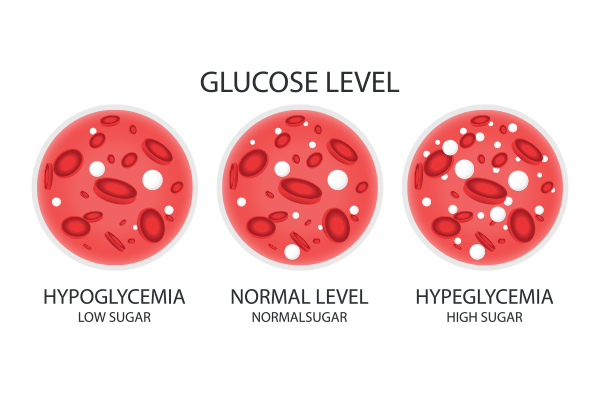
Managing blood sugar levels is critical for individuals with diabetes or those at risk of developing the condition. High blood sugar, also known as hyperglycemia, can lead to severe complications if left unchecked, including heart disease, nerve damage, kidney problems, and vision loss. In this blog, we’ll explore effective strategies to reduce blood sugar levels immediately and maintain long-term control.
Synopsis
Understanding Blood Sugar Spikes
Before diving into the methods to reduce blood sugar, it’s essential to understand what causes these spikes. Common triggers include:
-
High Carbohydrate Intake: Carbs break down into glucose, quickly raising blood sugar levels.
-
Lack of Physical Activity: Muscles use glucose during exercise, helping lower blood sugar.
-
Stress and Anxiety: These can trigger the release of hormones like cortisol that increase glucose levels.
-
Illness or Infection: The body releases stress hormones to fight illness, which can elevate blood sugar.
-
Medication Side Effects: Some drugs, like steroids, can cause hyperglycemia.

Immediate Ways to Lower Blood Sugar
1. Exercise Regularly
-
Engaging in physical activity is one of the quickest ways to lower blood sugar. Activities like brisk walking, jogging, cycling, or even dancing can help the muscles use up excess glucose.
-
Aim for 15-30 minutes of moderate exercise if your blood sugar is high but under control (below 250 mg/dL).
-
Note: Avoid intense exercise if your blood sugar is extremely high, as it may cause a paradoxical spike.
2. Drink Water and Stay Hydrated
-
Water helps flush excess sugar through urine and prevents dehydration, which can worsen hyperglycemia.
-
Aim to drink at least 8-10 glasses of water throughout the day.
-
Avoid sugary drinks, which can cause a rapid spike in glucose levels.
3. Consume Cinnamon or Apple Cider Vinegar
-
Studies suggest that cinnamon can improve insulin sensitivity and lower fasting blood sugar levels.
-
Apple cider vinegar (ACV) has been shown to enhance insulin function and reduce post-meal glucose spikes.
-
Mix 1-2 tablespoons of ACV in a glass of water or add cinnamon to your meals for a quick impact.
4. Deep Breathing and Stress Reduction
-
High stress levels can elevate blood sugar due to the release of cortisol and adrenaline.
-
Practice deep breathing, meditation, or progressive muscle relaxation to quickly calm the nervous system.
5. Eat High-Fibre, Low-Glycemic Foods
-
High-fibre foods slow down glucose absorption, helping stabilise blood sugar.
-
Include non-starchy vegetables, nuts, seeds, and whole grains in your diet.
6. Check Your Blood Sugar Levels Frequently
-
Regular monitoring helps you respond promptly to spikes and adjust your food or medication accordingly.
Quick Tips for Immediate Blood Sugar Control
|
Tip |
Description |
|
Exercise Regularly |
Physical activity helps muscles use glucose more effectively. |
|
Stay Hydrated |
Water helps flush excess glucose from your system. |
|
Eat a High-Fibre Snack |
Fibre can slow down glucose absorption. |
|
Practice Deep Breathing |
Reduces stress and lowers cortisol levels. |
|
Limit High-Glycemic Foods |
Avoid sugar-rich foods that cause rapid spikes. |
Long-Term Blood Sugar Management
Long-term blood sugar control is essential for overall health and can significantly reduce the risk of complications. Consider the following:
-
Maintaining a Healthy Weight
-
Excess body fat, particularly around the abdomen, is linked to insulin resistance.
-
Focus on regular exercise, portion control, and a balanced diet to achieve a healthy weight.
-
Weight loss, even as little as 5-10% of your body weight, can improve blood sugar control.
-
-
Following a Diabetes-Friendly Diet
-
Choose complex carbohydrates like whole grains, legumes, and vegetables over refined sugars.
-
Include lean protein and healthy fats to stabilise blood sugar levels.
-
Avoid processed foods and opt for fresh, nutrient-dense options.
-
-
Taking Medications as Prescribed
-
Consistently take prescribed medications to keep blood sugar within the target range.
-
Speak with your healthcare provider if you experience side effects or need adjustments.
-
-
Managing Sleep and Stress
-
Poor sleep and high stress levels can disrupt hormone balance, leading to higher blood sugar.
-
Aim for 7-9 hours of quality sleep per night and practice stress-reduction techniques like yoga or mindfulness.
-
When to Seek Medical Help
If you experience severe symptoms like confusion, rapid heartbeat, shortness of breath, or loss of consciousness, seek immediate medical attention. Chronic hyperglycemia can lead to serious complications, making regular check-ups with healthcare professionals crucial.
Need Professional Support?
Managing your blood sugar effectively requires comprehensive medical guidance. At Manipal Hospitals Delhi, our experienced endocrinologists and diabetes specialists provide personalised care plans to help you achieve optimal health. To book an appointment or learn more about our diabetes management services, visit our website or call us today.
Conclusion
Reducing blood sugar quickly is possible through a combination of physical activity, dietary adjustments, and stress management. However, it’s vital to focus on long-term strategies to prevent future spikes and maintain a healthy lifestyle. Remember, early intervention can significantly reduce the risk of complications and improve your overall quality of life. For expert care and support, reach out to Manipal Hospitals Delhi, where your health is our priority.
FAQ's
It depends on the individual, but physical activity, hydration, and stress reduction can lower blood sugar within 30 minutes to a few hours.
Yes, staying hydrated helps flush excess glucose from the bloodstream through urine.
High-fibre, low-glycemic foods like leafy greens, nuts, seeds, and whole grains can help stabilise blood sugar quickly.
Moderate exercise is generally safe if your blood sugar is below 250 mg/dL. However, avoid intense workouts if your levels are significantly elevated.
If you experience severe symptoms like confusion, rapid heartbeat, or loss of consciousness, seek immediate medical attention.





















 5 Min Read
5 Min Read




















